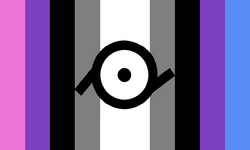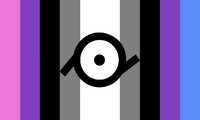Epicene
| |
This page is about a gender identity that is not widely used among gender-variant people. This does not mean that the identity is not valid, but that very few people are known to use this term. More information on uncommon identities... |
 Meaning The pink & blue represent traditional masculinity and femininity, the purple represents the combination of masculine and feminine, the black & grey represent being nothing or neither, and the white represents a combination of all of them. | |
| Related identities | Androgyne |
|---|---|
| Frequency | <0.1% |


Epicene is an adjective (sometimes substantive) that indicates a lack of gender distinction. The Order of the Epicene website includes a definition of epicene that they credit to the Oxford English Dictionary; 'that which exhibits characteristics of both genders, yet is neither'. The word derives from Greek epi meaning "on" and koinos meaning "common".[2] In linguistics, the adjective "epicene" is used to describe a word that has only one form for both male and female referents. Epicene can also be a nonbinary gender identity. Historically, epicene has been used to describe people who would be considered intersex by modern-day standards. While it has not been denoted as an intersex-exclusive label, it is important to be aware of this aspect of its history.
There is no widely recognized epicene flag. The proposed epicene flags shown here were created in January 2018 by by tumblr user paintedfaceslonghair and submitted to the ask-pride-color-schemes blog.
See also
External links
- 'Epicene'. Dictionary.com.
References
- ↑ https://www.tumblr.com/status-quo-hater/755135600588357632/epicene
- ↑ "epicene (adj.)". Online Etymology Dictionary. Archived from the original on 17 July 2023. Retrieved 31 January 2021.
| |
This article is a stub. You can help the Nonbinary wiki by expanding it! Note to editors: remember to always support the information you proved with external references! |
